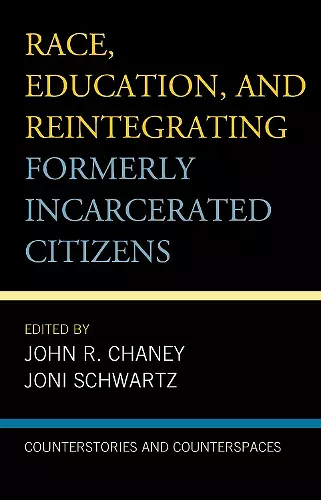Race, Education, and Reintegrating Formerly Incarcerated Citizens
Counterstories and Counterspaces
Joni Schwartz editor John R Chaney editor
Format:Hardback
Publisher:Lexington Books
Published:18th Jul '17
Currently unavailable, and unfortunately no date known when it will be back
This hardback is available in another edition too:
- Paperback£39.00(9781498540926)

This timely, readable text offers an authoritative and balanced analysis of how racially driven policies in America impact post release education as a leading pathway to social reintegration. Compelling research findings from an assemblage of college faculty, seasoned administrators, and criminal justice professionals are interwoven with first-person narratives from formerly incarcerated individuals. This book takes full advantage of its interdisciplinary mixture of voices and positionality to build its argument upon a three-part framework from Critical Race Theory (CRT). It convincingly utilizes the tools of academic research, counterstories, and counterspaces to make a persuasive case that the intersection of race, the criminal justice system, and education represent one of the greatest civil rights issues of our time. Part 1, “Context, Critical Race Theory and College Re-Entry,” explores the historical and current dynamics of these uniquely American intersections while linking Critical Race Theory with the field of re-entry and offering serious analysis of post incarceration and education initiatives. Interest convergence, white privilege, and writing from returning citizens as a way of “coming to voice” are also explored in this section. Part 2, “Counterstories,” offers case, comparative case, and phenomenological studies that include embedded quotations with first-person narratives contributed from formerly incarcerated students and graduates. This section also includes an honest and gripping analytic auto-ethnography from the book’s co-editor who readily reveals his experiences as both a faculty member and formerly incarcerated individual. Other highlighted topics include the issues of stigma, overcoming obstacles in the classroom, and the unique problems for returning citizens when acclimating to college culture. Combining qualitative research and descriptions of successful programs Part 3,“Counterspaces,” explores the dynamics of creating places within programs and classrooms that support physical, emotional, spiritual, and intellectual engagement for and with the formerly incarcerated through learner-centered, culturally sensitive, and racially explicit pedagogy. This book is designed to be a most welcome addition to any serious academic discussion focusing upon institutionalized racism and education’s use as a tool in reversing the mass incarceration of people of color in America.
Chaney and Schwarz have produced a book that is critically important for educators and those interested in helping re-build lives and communities of the formerly incarcerated. Race, Education, and Reintegrating Formerly Incarcerated Citizens has so many virtues to recommend it. Not only does it provide a critical analysis of the challenges facing the formerly incarcerated, but it also provides workable strategies for dealing with these challenges. The contributors speak authoritatively—either having experienced incarceration or worked with those who have. A whole section of the book is devoted to giving voice to the previously incarcerated and serves to humanize the adult learners in education programs. There is much to learn and benefit from in reading this book. I highly recommend for educators and those committed to social justice alike. -- Talmadge C. Guy, University of Georgia, Emeritus
Chaney and Schwartz have assembled a must-read primer on Black males and the prison system. The collection of writings expose the reader to the depth and breadth of this complex social phenomenon… Read this book—and be prepared to have your assumptions challenged! -- Dionne Rosser-Mims, Troy University
Reentry can be a very ambiguous term in the landscape of criminal justice reform. There has not been a consensus of what reentry means or its application in society. The only thing that can be agreed is a serious need for reentry services, but what that is or its implementation is anyone’s guess. But reading Race, Education, and Reintegrating Formerly Incarcerated Citizens: Counterstories and Counterspaces, edited by John R. Chaney and Joni Schwartz, has provided a way forward to begin to think anew about reentry and how to best serve the ever growing ranks of the formerly incarcerated. Years from now we will look at this book as the starting point of a collective effort to define reentry in the years to come. -- Kingsley A. Rowe, New York University
ISBN: 9781498540902
Dimensions: 240mm x 157mm x 22mm
Weight: 508g
212 pages